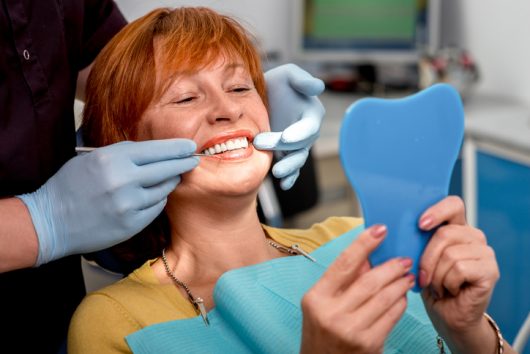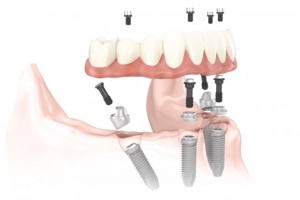 While tooth loss is a natural part of aging, many people face it with a heavy feeling of regret and even sadness. Aging isn’t easy, and if you’re staring the possibility of tooth loss in the eye, you’ll know exactly how difficult it can be.
While tooth loss is a natural part of aging, many people face it with a heavy feeling of regret and even sadness. Aging isn’t easy, and if you’re staring the possibility of tooth loss in the eye, you’ll know exactly how difficult it can be.

But while aging has an impact on your overall quality life many areas, dental health doesn’t have to be one of them. With modern dentistry, there are advanced options for tooth replacement available to you. This means your dental health can be just as good in your old age as it was in your youth, or perhaps even better!
The Problem With Regular Dentures
Traditionally, the only way to replace a full arch of teeth was to use regular, removable dentures. What this meant is that patients who lost all of their teeth were destined to live the rest of their lives with false teeth that could easily fall out or shift while they were eating or talking. These dentures were often also very uncomfortable.
Worse yet, the further you go back in history, the less comfortable (and more ethically questionable) dentures were. In the olden days, some dentures were even reported to have been made with teeth bought from grave robbers. Which is a horrific thought, to say the least!
Luckily modern dentures are all made using materials like dental acrylics. And for a long time now, patients have been able to use a traditional set of dentures with a clear conscience.
But while modern dentures are more ethical and comfortable than their historical counterparts, they’re still a long way from being the ideal tooth replacement option. A set of false teeth that rests on the gums can only be so comfortable, after all. And so denture wearers sometimes complain that their dentures are prone to shifting, or fit uncomfortably in their mouth.
Dentures With Dental Implants

Nowadays, dental implant specialists can combine the old concept of dentures with newer dental technologies such as dental implants. This allows for tooth replacement options where patients no longer have to worry about a traditional set of dentures that can shift in the mouth.
Implant-Supported Dentures
A popular option for using dentures with dental implants is to support a set of removable dentures with implants. Implant-supported dentures help to prevent dentures from shifting in the mouth or falling out. This goes a long way in increasing the overall comfort of using dentures. With no worry of dentures falling out, patients can go about doing everyday things like eating and talking with complete confidence.
The great thing about this option is that it’s also reasonably affordable, seeing as patients won’t need too many dental implants to support an arch of teeth (in some cases, as little as 2 implants are used for denture support). The main drawback of this option, however, is that these dentures are still removable, which means that patients will still need to remove them before going to bed every night.
Dentures also aren’t considered a lifelong tooth replacement option. All dentures require occasional adjustments and eventual replacement. The estimated life expectancy of dentures is between 5-10 years, depending on the quality of the dentures and how well a patient takes care of them.
All-on-4 Dental Implants
All-on-4 implants aren’t really like dentures. But the concept of all-on-4 implants is still similar to that of dentures in that the procedure was developed to help edentulous patients.
With the all-on-4 procedure, a patient can expect to get a new set of permanent, non-removable, implant-supported teeth. This means that a patient who has all-on-4 dental implants won’t have a special oral hygiene routine that involves denture care. All-on-4 implants can be cared for just like regular teeth, by brushing twice daily and following other good oral hygiene best practices.
When it comes to quality of life and convenience, all-on-4 implants have no drawbacks. However, the main drawback with this procedure for many patients is the price. To replace either the upper or lower arch of teeth, a dental implant specialist needs to place a minimum of 4 dental implants. Meaning patients who want to replace both their upper and lower teeth with all-on-4’s will need at least 8 dental implants.
However, considering the expenses of replacing dentures, the upfront investment of all-on-4’s (which never need replacement or adjustments) compares well to the price of implant-supported dentures. Depending on the age of a patient, all-on-4’s could even be cheaper in the long-run. This is especially true when patients who need tooth replacement are still under 60. So although all-on-4’s are more expensive initially, the improved quality of life and long-term satisfaction patients can expect from the procedure still makes it good option to consider.
Talk to an Implant Specialist
Every patient has individual needs to be considered. If you need tooth replacement, your best option will depend on a number of different things. But in all cases, the best place to start is to get advice from a dental implant specialist before making a final choice. A dental implant specialist will give you sound advice based on your current dental health and other circumstances that are unique to you.
http://www.colgate.com/en/us/oc/oral-health/cosmetic-dentistry/dentures/article/implant-supported-denture
http://www.ada.org/~/media/ADA/Publications/Files/ADA_PatientSmart_Dentures.pdf?la=en
http://www.denturist.bc.ca/when_denture_replacing.html
https://www.aaid-implant.org/about-dental-implants/denture-implants-and-implant-dentures-information-about-dental-implants/
http://www.premierexhibitions.com/exhibitions/4/4/bodies-exhibition/blog/edentulous-brief-history-dentures


